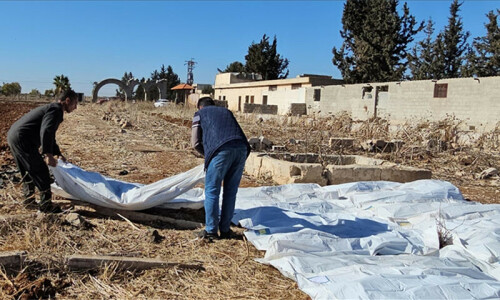ISTANBUL: President Recep Tayyip Erdogan on Friday inaugurated the third bridge over the Bosphorus Strait between Europe and Asia in Istanbul, a spectacular project at the heart of his drive to create a lasting historical legacy.
The work -- one of the longest suspension bridges in the world -- will allow Erdogan to show that his dream of creating a glitzy “new Turkey” with ultra-modern infrastructure is on track despite the July 15 failed coup and a string of militant attacks.

Erdogan cut the ribbon to open the bridge and was then driven across in a presidential bus flanked by a security convoy of dozens of cars and motorcycle outriders.
“To attain the level of a civilised nation is not possible with words but with actions,” said Erdogan, who has dominated Turkey from 2003-2014 as premier and from 2014 as president.
“We are connecting continents with the bridge,” he added.
“People die but their work remain immortal.”
'Work of art'
The openings of bridges across the Bosphorus -- the first in 1973 and the second in 1988 -- have been landmark dates in the modern history of Istanbul.
The new bridge -- technically a hybrid between a suspension and cable-stayed bridge --is the widest suspension bridge in the world with a width of 58.5 metres. Its span of 1,408 metres is the longest in the world between the supporting pylons.
It will also carry railway lines as well as vehicle traffic, making it the world's longest suspension bridge with a railway.
The bridge has been built by a South Korean joint venture of the Hyundai and SK Group companies with the total cost of the project put at $800-900 million.
The edifice “is not only a bridge but a work of art,” said Prime Minister Binali Yildirim who supervised construction during his long stint as transport minister.
Yildirim said the bridge would open to the public on Saturday and Erdogan added it would be toll free until August 31.
'Martyrs of July 15'
The premier compared Erdogan to Mehmet II The Conqueror, who seized the city of Constantinople from the Byzantines and famously carried ships over land to evade capture.
The Yavuz Sultan Selim bridge in Istanbul during its inauguration. -AFP
Sultan Mehmet “had the ships carried over land during the conquest of Istanbul” while “Erdogan made the cars pass beneath the sea with his projects.”
The Istanbul bridges have taken on an even greater symbolism in the wake of the July 15 coup aimed at ousting Erdogan from power.

Plotters from the army blocked the two existing bridges but were faced down by Erdogan supporters, leading to deadly clashes. The first bridge has since been renamed “Martyrs of July 15 Bridge”.
'Crazy projects'
Despite the trauma of the coup, Erdogan hopes the bridge will be just one of many of his self-proclaimed “crazy projects” to open in Istanbul in the next years.
Turkish Transport Minister Ahmet Arslan told AFP in an interview that the Eurasia tunnel -- a road passage underneath the Bosphorus alongside an undersea metro line that began service in 2013 -- would open on December 20.
A new international airport for Istanbul, planned as a giant Dubai-style hub linked to the new bridge by motorway, will open in the first quarter of 2018, he added.
The bridge is named after the 16th century Ottoman Sultan Selim the Grim (Yavuz Sultan Selim in Turkish), who conquered swathes of the Middle East during his eight-year rule and remains a figure of adulation for modern day Turks.
The name of the bridge has however also raised eyebrows, with Sultan Selim known for his ruthless methods as he expanded the empire into today's Egypt, Iraq, Iran, Syria and Saudi Arabia, as well as for massacres of Alevi Muslims.
One of Selim's legendary victories was at the battle of Marj Dabiq in modern-day Syria on August 24, 1516, where he smashed the Ottomans' Mamluk opponents to conquer much of the Middle East.
Several bloggers have noted that Turkey launched Wednesday's operation allegedly against militants in Syria -- two days before the bridge opening -- precisely 500 years to the day after the battle.













































Dear visitor, the comments section is undergoing an overhaul and will return soon.